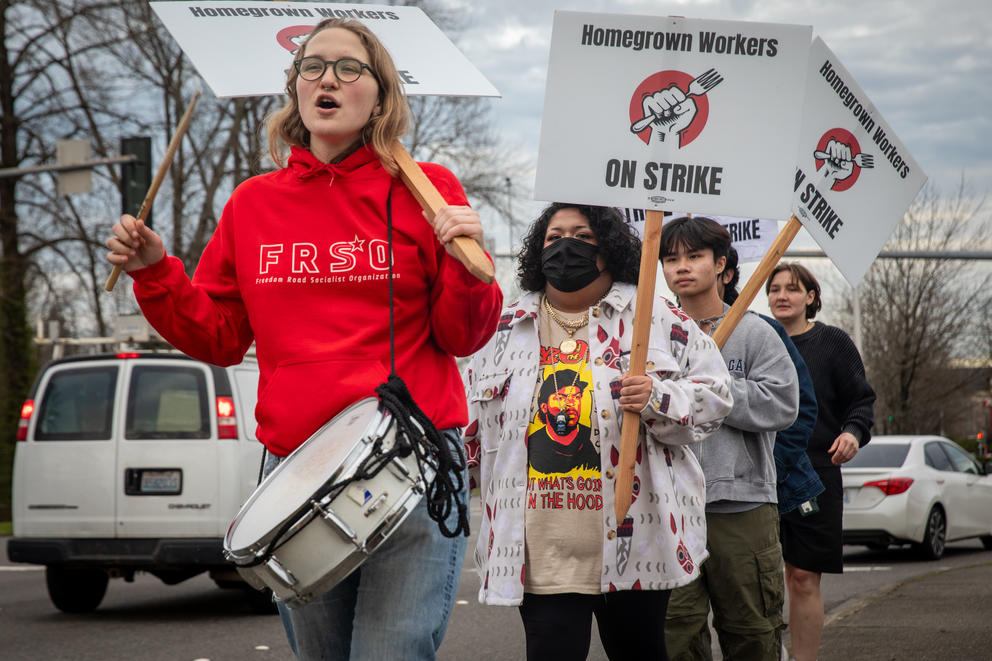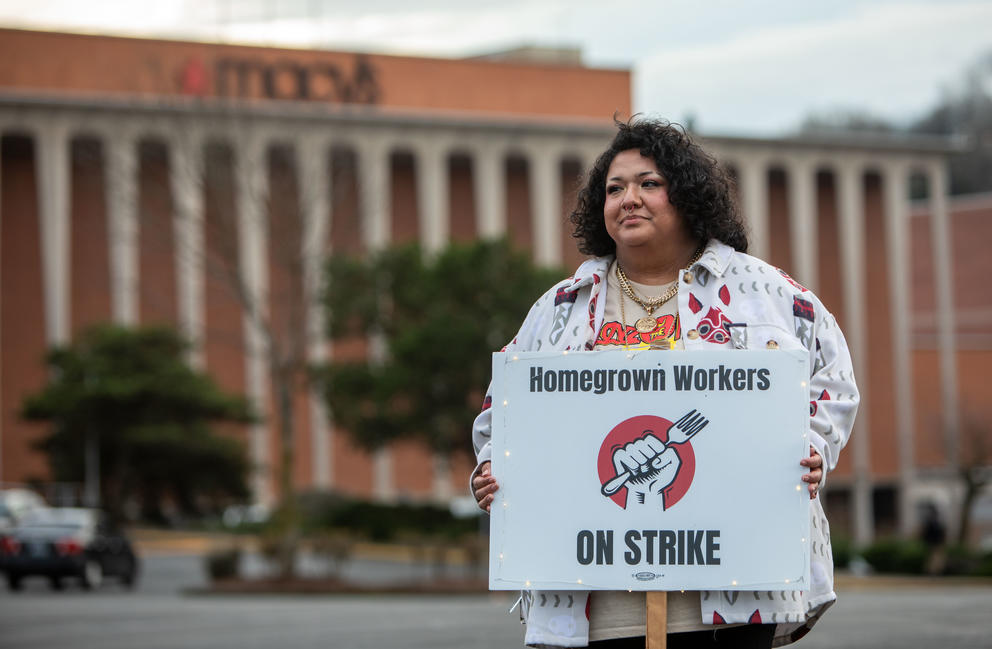“A lot of us were a little bit nervous about making rent and how we were gonna afford living,” Beliz said.
Beliz and fellow workers from the Seattle-area chain prepared for their second picket of the day along a thin strip of sidewalk that lines a five-lane road on the edge of Westfield Southcenter. Workers at the Redmond location walked out Oct. 30; Beliz and others at the Homegrown in the mall followed a month later.
“I’m just trying to learn to live with less,” Beliz said. “I’ve also had to avoid going to the doctor a few times. I know a few of us have.”
Companion bills before the Legislature this session would extend a financial safety net to people on the picket line by allowing striking workers to collect unemployment. House Bill 1893 and Senate Bill 5777 await a final vote in both chambers.
This story is part of Crosscut’s WA Workplace Watch, an investigative project covering worker safety and labor in Washington state.
One of the bill’s primary sponsors, Rep. Beth Doglio, D-Olympia, called the legislation a way to level the playing field a bit between workers and employers who refuse to negotiate fairly with their workforce. Low-wage workers cannot exercise the right to strike due to the significant financial burden, Doglio argued during a session of the Labor and Workplace committee.
“Employers know this,” she said, “and they use this as a tactic to refuse to negotiate in order to suppress wages and working conditions.”
The proposed bill strikes a provision from current law that prohibits workers from collecting unemployment pay due to a strike.
In general, unemployment benefits top out at $1,019 a week and are paid for by payroll taxes. Rates vary among companies depending on how much ex-employees collected in past unemployment claims and the number of employees.
In this bill, the cost of the additional unemployment payments for striking workers would be spread across all employers in the system.
Unlike most unemployment benefits, which are subject to a one-week waiting period, payments for striking workers would take an additional one to two weeks to begin.
Republicans, along with business associations, oppose the bill because it spreads the additional claims across all employers, which they say drives up costs for everyone, risking the stability of the trust fund, and encourages workers to strike or prolong work stoppages.
“If one employer is choosing not to negotiate with his or her employees, the whole state is going to pay because we’re going to pay for this out of the socialized part of unemployment,” Rep. Suzanne Schmidt, R-Spokane Valley, said during a discussion of the bill in the House’s Labor and Workplace Standards committee.
Unionization has surged throughout Seattle and the country in the wake of the pandemic as retail and service workers seek new protections. Several corporations headquartered in the region, such as Starbucks, Amazon and REI, have seen unprecedented organizing. Starbucks employees have spent two years awaiting a first union contract.
Barista Rachel Ybarra, one of those employees, argued in a January hearing that the bill allowing striking workers to collect unemployment tips the balance back toward workers, especially when companies resist unionization and draw out contract negotiations.
Since negotiations began, the Starbucks Workers United union has filed more than 700 unfair-labor charges against the company. So far, of those, the National Labor Relations Board has issued 50 decisions finding in favor of the union and ordered the company to rehire 46 employees.
“They’re blatantly violating labor law hoping to stall and starve out our union,” Ybarra told legislators. “Many of us don’t have the kind of savings that would allow us to use our collective power in a strike.”
Bob Battles, a director of government affairs at the Association of Washington Business, emphasized the concerns from across business, retail and the construction industries that the additional costs of the expanded unemployment benefits could risk the solvency of the unemployment-insurance trust fund.
Just as a pandemic is hard to predict, Battles told Crosscut, so is when or how many workers might go on strike.
The UI system was set up as a way to help individual employees get benefits when they’ve lost their job through no fault of their own, he added. “Not to get into the merit of strikes, it’s still by choice and you are asking employers to fund that.”
New York and New Jersey both have expanded unemployment benefits to striking workers. The California legislature passed a similar bill last year. But Gov. Gavin Newsom vetoed the expansion due to the nearly $20 billion in debt the state’s unemployment fund had accumulated.
Washington’s trust fund currently contains $3.7 billion in reserves, able to cover about 7.2 months of unemployment claims. It took a hit in the pandemic, dipping to $1.7 billion in 2021. It’s forecasted to continue growing, according to the state Employment Security Department.
The department projected the bill could result in 812 to 3,470 more unemployment claims a year, costing between $2.1 and $14.1 million in additional benefits. The high-end estimate would still equal less than 1% of the $1.5 billion in payments Washington workers collected last year.
Another $1.2 million is anticipated for up-front administrative costs to enable the agency to update systems and process new claims and appeals until that happens. Costs would then drop to about $74,000 a year going forward. The ESD does not anticipate an increase to companies’ unemployment tax rate from the additional unemployment benefits expected from this bill.
Find tools and resources in Crosscut’s Check Your Work guide to search workplace safety records and complaints for businesses in your community.
Some unions offer similar financial support to relieve the financial hardship from a work stoppage. Strike funds sometimes pay workers who spend time on the picket line.
Macy’s department store workers also were on strike last month. Nine days after workers walked out, the union reached a tentative agreement on a new contract to replace the one that had expired in February 2023.
With the union’s strike fund, Macy’s worker Nicole Hardin said she could basically match her paycheck. Without one, she likely would have been on the picket line anyway, coming from a long line of union membership and having the financial security to do so.
“I have no choice but to go on strike,” said Hardin, who’s worked at Macy’s for more than a decade and a half. “But I know for a lot of my co-workers, that if there wasn’t a strike fund, they wouldn’t have gone on strike because they have to feed their families.”
Joe Mizrahi, the secretary/treasurer of UFCW 3000 which represents Macy workers, said strike funds cannot always replace a paycheck or make up for the hardships of striking.
“It’s tiring – you’re out there on the picket line, you’re having difficult conversations with a co-worker who’s crossing a line or a customer who doesn’t want to be kept out,” Mizrahi told Crosscut. “Workers would much rather be at work, doing the job that they signed up to do, and that’s not going to change if they suddenly get unemployment benefits.”
Homegrown workers in Redmond walked out 102 days ago. Southcenter workers left 77 days ago. Those workers, along with those still on the job at eight other locations, continue to hash out details of the first contract at the bargaining table.
For Sydney Lankford – whose firing from the Redmond Homegrown shop drew allegations of retaliation and nudged workers toward their walkout – the strike fund offers a lot less than her regular wages.
“It’s hard to pay rent on it,” Lankford said. “Striking is incredibly frustrating, the whole goal is to get back to work.”







